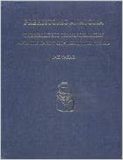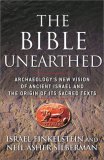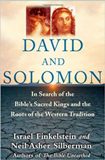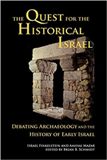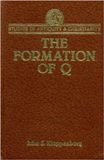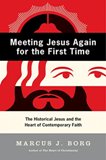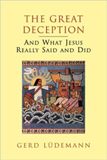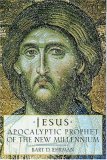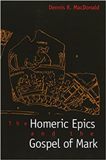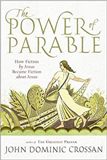|
1
2
3
|
From Christ To Jesus titleHow Christian Faith Evolved
from a Mythical Christ to an Historical Jesus
|
4
5
6
|
|
What's in the Title?
- It is inspired by the title of a book & documentary by current scholarship while taking the opposite side:
- See From Jesus to Christ by P. Fredriksen
- and the four-hour series From Jesus to Christ part 1 and part 2 by mostly members of the Jesus Seminar.
- It means some Jews got first a faith in a heavenly Christ (=Messiah) who would have reverted Adam's original sin through a mythical sacrifice. Then after the story of Jesus of Nazareth was created -sometime in the decade or two after the Jewish war (66-70 CE)- this Jewish sect started to include a recent historical man, either as a ghost or in real flesh.
-
It is also a reference to French historian P.L. Couchoud
who promoted the German thesis of the non-historicity of Jesus Christ.
He found a passage that explicitely says it:
"And being found in human form, he humbled himselfPhilippians 2:8-11
And became obedient unto death [even death on a cross].
Therefore God has highly exalted him,
And bestowed on him the name that is above every name,
That at the name of Jesus, every knee should bow,
In heaven and on earth, and under the earth,
And every tongue confess that Jesus Christ is Lord
To the glory of God the Father."
For Couchoud, what we read is that, because of his humiliating self-sacrifice, an unnamed heavenly being has been granted a mighty name that henceforth should call forth confessions of fealty from all beings in the cosmos. At the name "Jesus" every knee should bow, every tongue acknowledging his Lordship.“The God-Man does not receive the name of Jesus till after his crucifixion. That alone, in my judgment, is fatal to the historicity of Jesus.”P.L. Couchoud, 1939, The Creation of Christ

 What does History say?
What does History say?"The actions of Jesus present themselves to the verification of historians.
Nobody today can seriously pretend, in the name of History that Jesus has never existed."
Nobody today can seriously pretend, in the name of History that Jesus has never existed."
Catechism for adults of the French bishops. This wide spread idea can even be found in textbooks.
"No serious scholar has ventured to postulate the non-historicity of Jesus."
O. Betz What do you know about Jesus?
"to doubt the historical existence of Jesus at all...was reserved for an unrestrained, tendentious criticism of modern times into which it is not worth while to enter here"
G. Bornkamm 1960
"The total evidence [for the existence of Jesus] is so overpowering, so absolute that only the shallowest of intellects would dare to deny Jesus' existence."
P. Maier 2005
"No serious historian of any religious or nonreligious stripe doubts that Jesus of Nazareth really lived in the first century..."
C.A. Evans 2009
"He certainly existed, as virtually every competent scholar of antiquity, Christian or non-Christian, agrees, based on certain and clear evidence."
B. Ehrman Forged : writing in the name of God 2011
"It is not historians who propagate the 'Christ-myth' theories."
F.F. Bruce The New Testament Documents: are they reliable?
"To sum up, modern critical methods fail to support the Christ myth theory.
It has 'again and again been answered and annihilated by first rank scholars.'
In recent years, 'no serious scholar has ventured to postulate the non historicity of Jesus' or at any rate very few,
and they have not succeeded in disposing of the much stronger, indeed very abundant, evidence to the contrary."
M. Grant Jesus: An Historian's Review of the Gospels 1995
"I have to say that I do not know any respectable critical scholar who says that any more."
R. Burridge and G. Gould Jesus Now and Then [quote about the Jesus Myth] 2004
"most scholars regard the argument for Jesus' non-existence as unworthy of any response."
Jesus was a common name 2,000 years ago in Galilee,
and some people named Jesus must have been crucified among all the Jews the Romans killed.
This study is not trying to discredit this eventuality, but to investigate the birth of Christianity.
Particularly, it is challenging the mainstream view that:
"Christianity is based on the life and teachings of Jesus of Nazareth"
Wikipedia Christianity
Something experts are certain of:
"virtually all historians and scholars have concluded Jesus did exist as a historical figure."
Did Jesus Exist?
However, if one goes a little bit deeper, he will rapidly discover a deception (see the tab "6 Dogmatic Assumptions" below).
Indeed, apart from 2 or 3 exotic minds, all these theologians have assumed that the mouvement started with a man from Galilee,
probably a Jewish illiterate peasant, who would have been crucified in Jerusalem around 30 CE.
For the rest, there are almost as many theories on Jesus as there are books about him!
"Why is Jesus, alone of all historical figures, so covered by a cloud of unknowing
and a cloak of protective invisibility?
Why is Jesus more unknowable or less reconstructable than any other ancient person
about whom data has survived?"
J.D. Crossan The Birth of Christianity
Undeniably, for more than a hundred years, theologians have failed to extract the HJ (Historical Jesus) behind the Myth.
"There is nothing more negative than the result of the critical study of the life of Jesus.
The Jesus of Nazareth who came forward publicly as the Messiah,
who preached the ethic of the kingdom of God, who founded the kingdom of heaven upon earth,
and died to give his work its final consecration, never had any existence.
This image has not been destroyed from without, it has fallen to pieces,
cleft and disintegrated by the concrete historical problems which came to the surface one after another."
Well known conclusion of The Quest of the Historical Jesus by Albert Schweitzer
in 1906, that is still so much valid today.
At high level, the MJ (Mythical Jesus) theory is the opposite of any other theory
saying that it was Jesus life & death that triggered this colossal response among his followers.
But in the details, the MJ theory has a lot in common with modern critical scholarship
as they both agree that most of what is attributed to Jesus in the Gospels is fake.
These HJ minimal theories are skeptical of so much that their refusal to tackle the last step,
that the crucifixion of Jesus is not based on a recent event in Jerusalem, seems genuinely political
(see tab "A Hidden Agenda" below).
Their few attempts to support Jesus' existence have also been notable failures, as attested
by the Did Jesus Exist? by B. Ehrman (2013).
"Whether Christ did, or did not live, has nothing at all to do with
what the churches teach, or with what we believe. It is wholly a matter of evidence and a question of science.
The question is -- what does history say?
And that question must be settled in the court of historical criticism. If the thinking world is to hold to the position that Christ was a real character, there must be sufficient evidence to warrant that belief."
The question is -- what does history say?
And that question must be settled in the court of historical criticism. If the thinking world is to hold to the position that Christ was a real character, there must be sufficient evidence to warrant that belief."
What is at stake?
If the theory supported by this web site is correct, it will be, by far,
our most important case of Historical revisionism.
It might also shake the faith of 2.3 billion believers...
"The one duty we owe to history is to rewrite it."
| The Search for the Historical Jesus: Where are we today? | |||||||||||||||||||||||||||||||||||||||||||||||||||||||||||||||||||||||||||||||||||||||||||||||||||||||||||||||||||||||||||||||||||||||||||||||||||||||||||||||||||||||||||||||||||||||||||||||||||||||||||||||||||||||||||||||||||||||||||||||||||||||||||||||||||||||
| A Theologian Reserved Domain | Some Findings | ||||||||||||||||||||||||||||||||||||||||||||||||||||||||||||||||||||||||||||||||||||||||||||||||||||||||||||||||||||||||||||||||||||||||||||||||||||||||||||||||||||||||||||||||||||||||||||||||||||||||||||||||||||||||||||||||||||||||||||||||||||||||||||||||||||||
|
150 Years of Quest |
A Hidden Agenda |
6 Dogmatic Assumptions |
A Biased Methodology |
A Hated Subject |
O.T. Collapse |
Gospels Collapse |
A Religion of Parallels |
A Gap of Knowledge |
|||||||||||||||||||||||||||||||||||||||||||||||||||||||||||||||||||||||||||||||||||||||||||||||||||||||||||||||||||||||||||||||||||||||||||||||||||||||||||||||||||||||||||||||||||||||||||||||||||||||||||||||||||||||||||||||||||||||||||||||||||||||||||||||
As of today (2022), there have been three quests on the HJ (Historical Jesus), period with more interest and books among scholars.
They seek to find the man behind the many traditions surrounding Jesus.
It is a peculiarly modern quest, unlike the ancient or medieval worlds, our age wants the facts.
Ancient, medieval, early Christians never had such a thing.
Who would have question at that time the legitimacy of Christian faith in Jesus Christ?
3 - The Third Quest 1980-2003
Here, there has been at least one more split on how they view Jesus:
So I suggest it is time to start the fourth quest:
4 - The Jesus Exist Quest 2023-... Anyone can see from above that almost all Historians on Jesus are in reality Theologians.
Most of them are also priest/pastor/minister or former priest or had a spouse or father who was.
"Most men who write on Christian origins are trained theologians,
committed to certain conclusions before they begin." G.A. Wells
 Religious Affiliation in the United States
Religious Affiliation in the United StatesChristianity is still very present in western culture, despite it went done in the U.S. from 83% in 2003 to 72% in 2017,
mainly due to new generations of non-believers.
Most of the universities in the United States have a major workforce of teachers and
researchers devoted to something-or-other relating to the bible.
Many men and women depend on it for their living while being at the same time members of `faith communities'.
This is even more true for scholars of the New Testament as we can see in the previous tab A Quest of 150 Years.
The professionals of the field are not Historians but Theologians and most of them are or have been priest, pastor, minister...
The Christian Church is everywhere in their education and life.
In 2020 in the US, there were about
Many of these universities teach these kind of doctrines:
"Everything we do at Moody falls under the authority of the Bible, which
declares timeless truth that is relevant today and throughout every generation. We believe that understanding and sharing God's Word is a lifelong journey. And we're committed to providing encouragement for you in your walk with Christ." Bahrt Ehrman and many other scholars are their products, even if they can change side after.
A Theological Agenda
A conservative environment:
"The Servite major seminary was near Chicago but we students lived in complete isolation from the outside world.
Monastic life meant celibacy and liturgy, work and recreation, silence and study.
The curriculum was designed for safety rather than originality; obedience was the supreme virtue;
discussion and debate were hardly encouraged."
J.D. Crossan
"The theory that Christianity could have begun without an historical Jesus of Nazareth
has been adamantly resisted by New Testament scholarship since it was first put forward some 200 years ago.
It has generally been held by a small minority of investigators, usually 'outsiders.'
An important factor in this imbalance has been the fact that, traditionally,
the great majority working in the field of New Testament research have been religious apologists, theologians,
scholars who are products of divinity schools and university religion departments, not historians per se.
To suggest that a certain amount of negative bias may be operating among that majority
where the debate over an historical Jesus has been concerned, is simply to state the obvious.
Nor is such a statement to be considered out of order, especially in the face of the common 'argument'
so often put forward against the mythicist position: that the vast majority of New Testament scholars
have always rejected the proposition of a non-existent Jesus, and continue to do so.
In fact, the latter is simply an 'appeal to authority' and cannot by itself be given significant weight."
E. Doherty
And scholars recognize it:
"I am concerned, not with an unattainable objectivity, but with an attainable honesty."
"the historical Jesus research is becoming something of a scholarly bad joke.
it is impossible to avoid the suspicion that historical Jesus research is a very safe place
to do theology and call it history, to do autobiography and call it biography."
J.D. Crossan The Historical Jesus
A Financial Agenda

There is a whole economic ecosystem based on the Bible for which so many people depend on, including most of our theologians.
It exists almost everywhere in the world and particularly in the United States where
study shows that the Faith economy is worth $1.2tn a year
– more than the combined revenues of the 10 biggest tech firms in America.
“the faith sector is undoubtedly a significant component of the overall American economy,
impacting and involving the lives of the majority of the US population”.
The Guardian: Religion in US 'worth more than Google and Apple combined'
A Self-Preservation Agenda
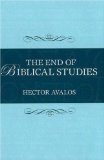
Hector Avalos (1958-2021) -Harvard Phd of Philosophy and former Pentecostal preacher-
argues that biblical studies, as we know it, should end, because it is just religious apologetics, not an academic discipline or a branch of scholarship.
In this radical critique of his own academic specialty, he outlines two main arguments:
Avalos shows first that the principal subdisciplines of biblical studies
(textual criticism, archaeology, historical criticism, literary criticism, biblical theology, and translations)
are still influenced by religiously motivated agendas despite claims to independence from religious premises.
For example, the translations of the bible are largely bowdlerised.
In the second part, he focuses on the infrastructure that supports academic biblical studies
to maintain the value of the profession and the Bible.
This infrastructure includes academia (public and private universities and colleges), churches,
the media-publishing complex, and professional organizations such as the Society of Biblical Literature
-7,000 self-serving members who have nothing useful or original to offer.
He laments that the publishing industry and academia have such a vested interest in keeping our "bibliolatry" worship alive.
"Bible Study" is a thoroughly worn out field where nothing new has been discovered
or analyzed for decades. Even worse than this, academics are fully aware of the futility of further study.
Avalos points this out by quoting extensively from academics who are fully devoted to their profession,
but strangely honest about how difficult it is to find anything remotely new to say.
He shows that biblical scholarship, far from being a neutral and objective enterprise,
is motivated even today by theological presuppositions."
"I have taken it for granted that Jesus of Nazareth existed."
Jesus and the Victory of God
"I am not even interested in trying [to prove that Jesus existed]"
J.D. Crossan
"The doubt as to whether Jesus really existed is unfounded and not worth refutation.
No sane persone can doubt..." Jesus and the Word
B. Ehrman himself asserted that the present state of New Testament scholarship is such
that an established scholar should present his Life of Jesus, without considering whether this figure, in fact, lived as a historical person.
The assumptions implied reflect a serious problem regarding the historical quality of scholarship in biblical
studies—not least that which presents itself as self-evidently historical-critical.
Six undisputable historical facts
However
"none of this is told of Jesus in the extant Christian Epistles (Pauline and others)
which are either earlier than the gospels or early enough to have been written independently of them." G.A. Wells
Earliest Christianity (1999)

The entire community (or almost) of scholars are assuming at least these 6 'facts' before they start any study.
Yet, these 'facts' exist solely in the Gospels ... which are the own target of their investigation!
They also assume that the first apostles like Paul
For how long will 'scholarship' refuse to question these 6 hypotheses?
And think a little bit outside its "seminary boxes"?
Since the beginning, you can smell that there is something wrong going on here:
"the criteria reasonably used by historians writing about important political figures
such as Julius Caesar need modification in dealing with the historicity of Jesus" Jesus: Evidence and Argument Or Mythicist Myths 2014
As we have seen in the previous Tab "6 Dogmatic Assumptions",
scholarship almost never address the existence of Jesus.
The few times they try, their criterions are fallacious.
The Gospels proving the Gospels
In his book Did Jesus Exist? B. Ehrman
argues that the synoptic gospels are based on earlier written traditions that are themselves based on earlier oral traditions
that go back close to the "traditional date of the death of Jesus" (p93).
Therefore Jesus existed. This is special pleading and circular reasoning on a heroic scale.
Or the treason of Judas
according to in this article in French (my translation below).
"First, on the historical side : the twelve apostles really existed. The four Gospels are unanimous on this point,
and not only the entire posterieur tradition attest it, but the presence of Judas in this small group constituates a famous proof."
"Who would have brought this traitor from the intimate circle of Jesus if it would have been invented?
This treason is too troubling to not be historical."
All these have led Christian scholarship to the belated conclusion that Judas himself was probably an invention of .
How can a French respected journal like "Le Monde" prints this article by without challenging it?
Embarrassment
Supposedly, The crucifixion of Jesus is an example of an event that meets the criterion of embarrassment.
This method of execution was considered one of the most shameful and degrading in the Roman world,
so it is the least likely to have been invented by the followers of Jesus.
See Wikipedia
However, it is just another Christian invention that doesn't stand in front history:
- Attis vs. Jesus
R. Carrier On The Historicity of Jesus
Or raped/abducted like Persephone, the daughter of Zeus and Demeter or dismembered in 42 pieces like Osiris...
- Spiderman vs. Jesus
"Now, what do we get if we apply the Criterion of Embarrassment to the Spiderman character.
What kind of superhero:
These type of things never happen to Superman or Batman. Why would someone write a superheroe story and make the character
continue to be awkward even after he becomes a superheroe?
By the Criterion of Embarassment we must declare that Spiderman is a real historical person."
From a post by PhilosopherJay on the Internet Infidels Discussion Board
I describe below two kinds of intolerance against the HJ studies:
1 - The right to study Jesus
For Catholics
As usual, Catholics lag behind. For a long time, HJ studies were forbidden by the Catholic Church.
See Vatican
"These books are sacred and canonical because they contain revelation without error,
and because, written by the inspiration of the Holy Ghost, they have God for their author."
Sacred Vatican Council 1870
"It will never be lawful to restrict inspiration merely to certain parts of the Holy Scripture,
or to grant that the sacred writers could have made a mistake...
They render in exact language, with infallible truth, all that God commanded and nothing else;
without that, God would not be the Author of the Scripture in its entirety."
"Those who maintain that
an error is possible in any genuine passage of the sacred writings,
either pervert the Catholic notion of inspiration, or make God the author of such error...
It is only in 1943 that, reversing the previous approach,
Pope Pius XII expressed approval of historical-critical methods in his encyclical Divino afflante Spiritu.
Although it was still stating that Scripture teaches
"solidly, faithfully and without error that truth which God wanted put into sacred writings for the sake of salvation",
R. Brown points out the ambiguity of this statement, which opened the way for a new interpretation of inerrancy
by shifting from a literal interpretation of the text towards a focus on "the extent to which it conforms to the salvific purpose of God."
Still, Catholic scholar like R. Brown often had more success with protestants than his own house.
For example, pertaining to the defined dogma of the Virgin Birth of Jesus, Pope John Paul II,
writing after Brown and the others set forth their arguments,
officially rejected their position in July, 1996 when he stated:
"The Gospels contain the explicit affirmation of a virginal conception of the biological order, brought about by the Holy Spirit.
The Church made this truth her own, beginning with the very first formulations of the faith.
The faith represented in the Gospels is confirmed without interruption in later Tradition.
The formulas of faith of the first Christian writers presuppose the assertion of virginal birth,
a real, historical virginal conception of Jesus...
The solemn definitions of faith by the ecumenical councils and the papal Magisterium,
which follow the first brief formulas of faith, are in perfect harmony with this truth."
In another case in 2012, in response to T. Brodie's publication of his view that Jesus was mythical,
Beyond the Quest for the Historical Jesus, the Dominican order banned him from writing and lecturing.
So, we understand why there aren't more Catholic priests studying the HJ or why they usually divorce from the Church
when they do (like Crossan).
See Wikipedia R. Brown and
Traditional Catholic Scholars Long Opposed Fr. Brown's Theories
Remember the Index Librorum Prohibitorum?
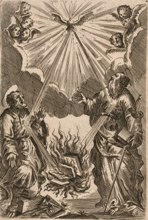 Title page from a 1711 edition depicting the Holy Ghost supplying the book-burning fire It was a list of publications deemed heretical or contrary to morality by the Congregation for the Doctrine of the Faith
and Catholics were forbidden to read them. This Index was formally abolished in June 1966 by Pope Paul VI.
It included all books from Giordano Bruno,
who was condemned by 8 Cardinals in 1600 to have his tongue imprisoned then hung upside down naked before finally being burned at the stake.
Other noteworthy figures on the Index include
Copernicus, Kepler, Hobbes, Pascal, Descartes, Rabelais, Montaigne, Spinoza, La Fontaine, Montesquieu, Voltaire, Rousseau, Diderot, Hume, Kant, Stendhal, Balzac, Dumas, Flaubert, Zola, Hugo,
Bergson, Sand, Sartre, Gide, de Beauvoir...
Without any surprise, the Index also contained many theologians and translators of the Bible, and historians of religion.
For example: R. Simon (17th Century) whose Histoire critique du Vieux Testament inaugured the critical study of sacred texts,
C.F. Dupuis, D.F. Strauss, E. Renan, A. Loisy, P.L. Couchoud...
For Protestants
The first major book of E.P. Sanders, Paul and Palestinian Judaism, was published
in 1977, while it was written 2 years earlier but had difficulty to be published due to its controversial nature.
After announcing his nonbelief publicly last year, Gerd Ludemann,
a biblical scholar and George-August University faculty member,
has been denied his academic rights in his teaching position.
Pressured by the church in the wake of Professor Ludemann's deconversion, the University
and the Theological Faculty have effectively barred him from offering courses or advising students.
Dr. Ludemann has informed Internet Infidels, Inc. that he no longer considers himself a Christian in any sense of the word...
Moreover, he has written a book entitled The Great Deception: And What Jesus Really
Said and Did (SCM Press) which outlines many of his objections to the Christian
faith. Not surprisingly, none of the American Christian presses which published
his previous works are willing to publish The Great Deception.
Internet Infidels Newsletter"The Confederation of Protestant Churches in Lower Saxony has objected to my teaching
because in my publications and in my scholarly work I have engaged in critical discussions
of the Protestant confession and the results of my research are not acceptable to
the Protestant Churches in Lower Saxony and the Administration of the University
of Gottingen. Therefore although I am an accredited New Testament scholar the President
of the University of Gottingen has forbidden my chair to be designated a Chair of New Testament Studies."
Gerd Ludemann at the Infidels
If one can lose his job because he acknowledges he is not christian,
one would think twice before supposing Jesus never existed!
There are in the United States a plethora of Christian fundamentalists sects that still claim the inerrancy of the Scriptures:
Independent Baptist,
Lambeth Quadrilateral,
Traditionalist Catholicism,
Conservative Holiness Movement,
Mormon fundamentalism,
Reformed fundamentalism like the Orthodox Presbyterian Church
and many evangelical Nondenominationalism...
"It is ironic that Roman Catholic scholars are emerging from the dark ages of theological
tyranny just as many Protestant scholars are reentering it as a consequence of the
dictatorial tactics of the Southern Baptist Convention and other fundamentalisms."
R. Funk and R. Hoover The Five Gospels2 - The right to argue Jesus is a Myth
In Scholarship
This web site already displays many quotes from scholars resorting on the Argument of Authority, even provocation and insults.
Their books reviews are also frankly dishonest, see for example the one on Bart Ehrman and the Quest of the Historical Jesus of Nazareth
that N. Godfrey criticizes.
In Online Discussion Forum
There, it is even more toxic.
You can see moderators creating entirely fake messages assigned to you in order to expulse you from their forum...
No need to spend much time on it, a couple of examples below on IMDb will be enough.
Here are some extracts from the IMDB message boards for the documentary "The God Who Wasn't There"
before it closed in 2017.
"What are you to gain from this?
To proove that Jesus doesn't exist. You feel abandoned, so you believe that your justified to harrass ppl who have something to believe in and take it away because you, yourself have no belief in God. You're just insecure. Who cares if ppl believe in Jesus, it's a belief, why do you find the need to cram it down ppl's throats. What have they done to you? Your what's wrong with society, someone who claims to be a "truthseeker." The only ppl that should be delt with are religous extremists, not regular christians." "So why don't you have the balls to say that Buddha didn't exist?
There's less data for him than Jesus.
Is it just because you're an anti-Christian bigot? (perhaps you've stopped beating your wife too, but I think you get the point)" "Time out, gentleman!
Can I just say, Kurgan-10 [ndr: a guy who writes a ton of long messages without having a clue of anything],
how much I admire the patience it must take to so fully address this dickw*d's ramblings.
I have an image of a zoo keeper lovingly sponging down a monkey every time he rolls in his own sh*t. It's almost touching.
I can only hope you have all of those facts in your head and don't have to spend time in actual research
for the sake of a thread on a board that's basically (let's face it) a honeytrap for morons and timewasters.
I could be the only other person reading it, and I've only skimmed it in half an hour.
Would you not be better employed directing your formidable intelligence and learning to some more worthy end?
Seriously, some monkeys will never be clean."
The Collapse of the Old Testament and other Apocrypha Texts
"In Jewish and pagan antiquity, in matters of religious persuasion, fabricating stories was the norm, not the exception...
We therefore must approach all ancient religious literature from an assumption of doubt,
and must work to confirm any given story or account as true, not the other way around."
On the Historicity of Jesus
See the quantity of books we have: Early Jewish Writings by .
Jewish, as well as pagan faith literature were based on fake stories passed off as fact.
Books Full of Miracles
Supernatural is everywhere in the Old Testament and often at the basis of the story.Many of them have been re-written in the New Testament.
Archaeology killed much of the Old Testament
In 1900, the situation was that archealogy had plenty of evidences for
After a century that has seen an unprecedented rise of science, research and biblical critics, what is left? "The historical saga contained in the Bible
-- from Abraham's encounter with God and his journey to Canaan,
to Moses deliverance of the children of Israel from bondage,
to the rise and fall of the kingdoms of Israel and Judah
--was not a miraculous revelation, but a brilliant product of the human imagination.
It was first conceived - as recent archaeological findings suggest-
during the span of two or three generations, about twenty-six hundred years ago."
Israel Finkelstein The Bible Unearthed p.1"Yet many of the archaeological props that once bolstered the historical basis
of the David and Solomon narratives have recently been called into question.
The actual extent of the Davidic 'empire' is hotly debated.
Diging in Jerusalem has failed to produce evidence that it was a great city
in David or Solomon's time. And the monuments ascribed to Solomon are
now most plausibly connected with other kings.
Thus a reconsideration of the evidence has enormous implications.
For if there were no patriarchs, no Exodus, no conquest of Canaan
- and no prosperous united monarchy under David and Solomon-
can we say that early biblical Israel, as described in the five books of Moses
and the books of Joshua, Judges, and Samuel, ever existed?" I. Finkelstein The Bible Unearthed p.124
The minimalist position is a concensus nowadays since most of its opponents like William G. Dever became friends with it:
"Originally I wrote to frustrate the Biblical minimalists; then I became one of them, more or less."Biblical Archaeology Review p.54 "Losing Faith" (March/April 2007) At the beginning of Christianity, the process of inventing historical and religious stories
was well established by the Jews for several centuries.
The Gospels' stories about Jesus, not only fit the same mold than the ones in the O.T., but they are most of the time literally based on them!
To know that the original tales were fake is a strong argument against the reliability of the ones that came after.
Gospels Fictions
Over the last 150 years there has been a rise in skepticism with regard to the historical validity of the Gospels.
Modern scholarship holds now non-traditional views of Jesus, primarily that he said and did only a small percentage of what the Gospels claim.
There are many reasons for that.
For example, studies in the ancient art of composition clarified their genre and purpose:
they are allegories and metaphors. The stories, characters and decor are setup to serve symbolic meanings.
It would take too much time to resume here all the arguments 'against' the Gospels.
It shouldn't even stop there. To be fair, we would have to expose all the ones 'for' too, even if it is to criticize them.
Indeed, there are many conservative & dogmatic books written by deeply religious persons
that try to salvage what they can, usually in the most ignorant and dishonest manner.
But there won't be coming back from what has been securely found.
In any case, proving (including in some ways disproving) the Gospels by the Gospels is a logical fallacy: a circular raisonning.
Million of stories have no supernatural elements or technical implausibility, yet they are entirely fictitious.
Whatever is written in the Gospels, there will always be a good possibility that it was invented by its author.
Thus, at the end, the solution for the Gospels is elsewhere. They need to be corroborated or not by external material.
Like for the Epistles, the efficient approach taken by this web site is simply to extract from the Gospels what they say about Jesus and how:
see .
There, I do reuse much findings of this scholarship, like historical aberrations and parrallels in the Jewish or Hellenic world.
Here is a list non-exhaustive of recent books by critical scholars very dubious about the Gospels:
This generation owes a lot to the previous ones as we can see in the first tab "150 Years of Quest".
Although Wikipedia is biased concerning the origin of Christianity, it still contains a large amount of information
Wikipedia: Historical reliability of the Gospels
It is worth noting in the 1990s, the results of an American group of around 50 critical biblical scholars (the Jesus Seminar)
who voted on the sayings of Jesus:
It is ironical to see that the same theologians who scoff at the Myth also admit:
"I do indeed think that we can now know almost nothing concerning the life and personality of Jesus,
since the early Christian sources show no interest in either and are, moreover, fragmentary and often legendary."
R. Bultmann
A Religion of Parallels - Solving the Puzzle
The New Testament records are rewritings or transformations of older texts and ideas that existed at that time,
giving a clear sense of where they come from. Christianity was not special but a product of its time.
As such, Christianity is really a puzzle where pieces have either a Hellenic or Jewish origin.
It was the great synthesizer of its time.
E.P. Sanders described the attractiveness of these types of comparative studies:
"They are not all that easy, but they are an awful lot of fun."
and argued that more are needed.
Jesus ≠ God
Knowing that everything in Christianity can be found elsewhere,
there is no reason to believe there is more God behind it than elsewhere.
What is the point of coming to earth if it is to repeat what everybody say in your neighbourhood? ;-)
Analogies and parallels with other pre Jesus-like characters were not denied by the church fathers;
but they were explaining them as counterfeits and imitations created by Satan from the scriptures in order to deceive.
"And when we say also that the Word, who is the first-birth of God, was produced without sexual union,
and that He, Jesus Christ, our Teacher, was crucified and died, and rose again, and ascended into heaven,
we propound nothing different from what you believe regarding those whom you esteem sons of Jupiter."
Justin Martyr The First Apology"For when they tell that Bacchus, son of Jupiter,
Justin Martyr Dialogue with Trypho
And when they tell that Hercules was strong,
"Scholarship erodes faith."
(former Benedictine monk and priest)
The results of modern scholarship about the HJ have not reached yet the masses, far from that.
In Liberating the Gospels, J.S. Spong explains:
"So vivid are these details [ndr: the Passion of Jesus in Jerusalem], so clear are the pictures they paint,
that there remains a general consensus in both church and society that these stories
surely were literally created from vivid eyewitness recollections.
The assumption is made, without much internal debate, that what we read here are literal and historic facts.
Indeed, to think otherwise for most church people is almost inconceivable.

Yet that easy leap from familiar data to historic accuracy has been challenged increasingly in the last century,
not by critics of the Christian faith who have abandoned organized religion in droves,
but rather by the world of New Testament scholarship.
Between the academy in which our clergy are trained and the pews in which our church members sit
is a gap in knowledge of enormous proportions.
Indeed, that gap might better be described as a void.
To listen to the sermons of many clergy, one would have to conclude either that
they did not learn what is readily available in the centers of theological study
or that they have decided not to share it.
Perhaps a better explanation might be that this generation of clergy,
unable themselves to process what they have learned or unable to correlate it with what they themselves believe,
decided simply to ignore or suppress this biblical scholarship for as long as they could.
If that is a more accurate explanation, then maybe what we are facing today is that
the time limit on that process of ignoring or suppressing biblical scholarship has now finally run its course.
For many claims can be made about the passion story of the gospels,
but claims of historical accuracy of literal facts are not among those that will stand."
It is always a surprise for me to see how much the vast majority of
Christians have little interest in what Jesus really did and said, even what kind of man he was. Was he not God?
Despite numerous hours in the media about the Bible,
critical historical studies about the sacred texts and the origin of the movement are never put forward.
Many Christians see them suspiciously.
The Westar Institute: An Advocate for Religious Literacy
At the end of the 1980s, an organisation was founded by Robert Funk
 in order to change this state of things. Westar is not affiliated with any religious institution nor does it advocate a particular theological point of view.
in order to change this state of things. Westar is not affiliated with any religious institution nor does it advocate a particular theological point of view."Westar's twofold mission is
"Through publications, educational programs, and research projects like the Jesus Seminar,
Westar has opened up a new kind of conversation about religion."
www.westarinstitute.orgThese are certainly good principles.
but it didn't work so well as secular people ignore it and the Church mocked it.
A Historical Religion
"Christianity is a historical religion which claims that the God who made the universe actually became a man
— a real human being who lived in a particular time and in a particular place.
As a result, the idea of searching for the historical truth about Jesus made sense to me."
Brant Pitre The Case for Jesus

At a time when information can flow so easily, it is a shame to see this work hidden and unknown by the masses.
Yet, a book like the Da Vinci Code (although pure fiction) has been a huge commercial success
and a massive international bestseller:
It shows that people are interested by Jesus as a God, but also as a Man.
Something quite normal in a society and culture still so much involved with the Christian faith.
|
|||||||||||||||||||||||||||||||||||||||||||||||||||||||||||||||||||||||||||||||||||||||||||||||||||||||||||||||||||||||||||||||||||||||||||||||||||||||||||||||||||||||||||||||||||||||||||||||||||||||||||||||||||||||||||||||||||||||||||||||||||||||||||||||||||||||
|
"It ain't what you don't know that gets you into trouble.
It's what you know for sure that just ain't so." Mark Twain
|
|||||||||||||||||||||||||||||||||||||||||||||||||||||||||||||||||||||||||||||||||||||||||||||||||||||||||||||||||||||||||||||||||||||||||||||||||||||||||||||||||||||||||||||||||||||||||||||||||||||||||||||||||||||||||||||||||||||||||||||||||||||||||||||||||||||||

 7 Theories on Jesus
7 Theories on Jesus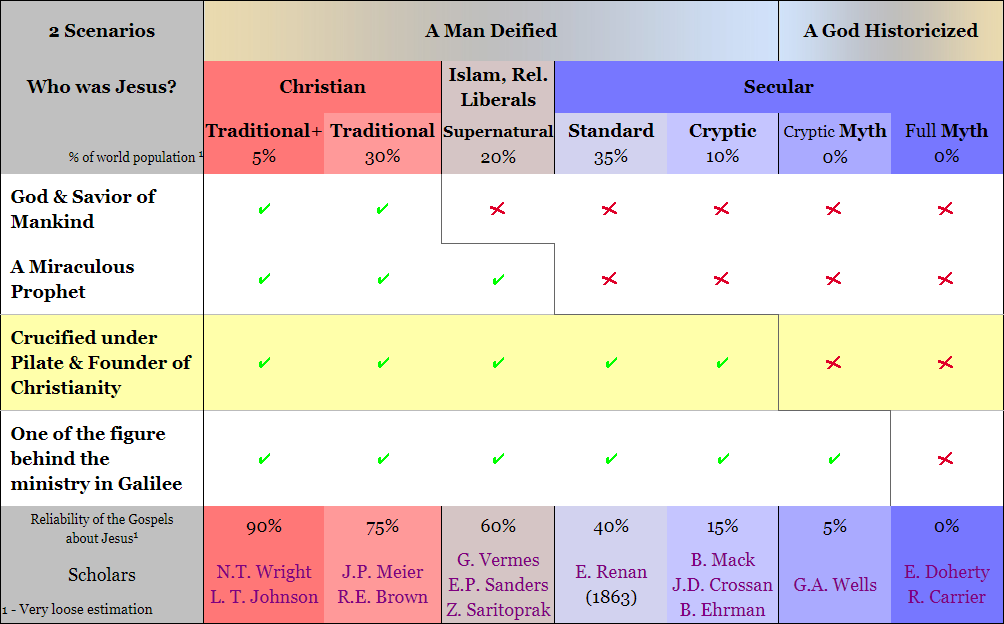
What kind of Man was Jesus?
The Cryptic theory of modern scholars has many different versions, as would be the Cryptic Myth.
- Hellenistic Hero
- Revolutionary
- Wisdom Sage
- Man of the Spirit
- Prophet of Social Change
- Apocalyptic Prophet...
See Historical Jesus Theories by
What kind of Myth was Jesus?
The two Jesus Myth theories say that Christianity began with the belief in a Mythical Christ,
with no connections whatsoever with a recent man who would have lived in Galilee or elsewhere.
They place his act of salvation -a crucifixion- in
- Time: the mythical past
- Location: one of the lower sphere of heaven, or an unknown spot on earth.
The progress made by the Jesus Myth theory
The Mythic Jesus viewpoint is not a new one, having been suggested for about 2 centuries.
In the past, some of its arguments have been admittedly flawed while others are still valid today.
It is the same story for the thousand of books arguing for a particular Historical Jesus (HJ):
most of them are outdated and irrelevant today.
Here is a list of the
best books defending the MJ:
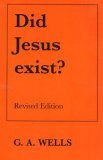
- B. Bauer, 1841, Criticism of the Gospel History of the Synoptics
- A. Drews, 1910, The Christ Myth
- P.L. Couchoud, 1939, The Creation of Christ, 1937 Jésus : Le Dieu fait homme
- G.A. Wells, 1970, The Jesus of the early Christians, 1975, Did Jesus Exist?, 1998 The Jesus Myth
- E. Doherty, 1999, The Jesus Puzzle, 2009, Jesus: Neither God Nor Man
- R. Price, 2000, Deconstructing Jesus, 2003, The Incredible Shrinking Son of Man
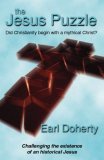
- T.L. Thompson, 2007, The Messiah Myth: The Near Eastern Roots of Jesus and David
- T.L. Brodie, 2012, Beyond the Quest for the Historical Jesus: Memoir of a Discovery
- R. Lataster, 2013, there was no Jesus, there is no God
- R. Carrrier, 2014, On the Historicity of Jesus: Why We Might Have Reason for Doubt
- R.G. Price, 2018, Deciphering the Gospels: Proves Jesus Never Existed
R. Price and T.L. Thompson are not fully promoting the Myth
but more an agnostic view about Jesus.
The Myth theory has progressed a lot in the last 50 years, thanks to a group of excellent scholars
like G.A. Wells, E. Doherty, R. Price, R. Carrrier
and also in part to standard modern critical scholarship who has shown that so much attributed to Jesus is fake.
Of course, this progression can only come at the expense of the HJ theory.
The lack of any valid response
On the other side, here are
the most famous books for the HJ:
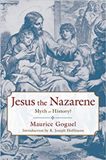
- S.J. Case, 1912 The Historicity of Jesus
- T. Thorburn, 1916 The mythical interpretation of the Gospel
- M. Goguel, 1926 Jesus the Nazarene: Myth or History?
- R. T. France, 1986 The Evidence for Jesus
- G. N. Stanton, 1989 The Gospels and Jesus
- R.E. Van Voorst, 2000 Jesus Outside the New Testament
- B. Ehrman, 2012 Did Jesus Exist?: The Historical Argument for Jesus of Nazareth
- M. Casey, 2014 Jesus: Evidence and Argument or Mythicist Myths?
The handful of responses against the JM research and findings have been desperately bad.
They have consistently ignored, misunderstood or misrepresented their arguments, see for examples
Ehrman on Jesus: A Failure of Facts and Logic or
Ehrman on Historicity Recap by R. Carrier
and Earl Doherty’s response to Bart Ehrman.
R. Carrier also computed a
List of Responses to Defenders of the Historicity of Jesus.
The most painful is how much they regularly rely on these 3 logical fallacies:
- We all say so. Argument from authority
- Only the ones with a specific credential and appointment at a university can talk about it. No True Scotsman
- HJ deniers are only motivated by a desire to denounce religion without examining historical evidence. Genetic fallacy
"One of the great commandments of science is, "Mistrust arguments from authority."
... Too many such arguments have proved too painfully wrong.
Authorities must prove their contentions like everybody else."
... Too many such arguments have proved too painfully wrong.
Authorities must prove their contentions like everybody else."
C. Sagan The Demon-Haunted World: Science as a Candle in the Dark
This web site supports the Myth theory developed initially by G.A Wells
(although he owes a great deal to previous works) then E. Doherty and nowadays R. Carrrier.
It examined everything the Epistles & the Gospels say about Jesus,
along with the religious & philosophical context of the time.
| Man | Passion in Jerusalem |
Miracles & Prophecies |
God & Savior |
Probability | |
| A Deity Historicized | Secular | ||||
 |
 |
 |
 |
||
| Minor Nobody |
 |
 |
 |
||
| A Deified Man from Galilee | |||||
| Minor Nobody |
 |
 |
 |
||
| Famous |  |
 |
 |
||
| Famous |  |
 |
 |
Supernatural | |
| Famous |  |
 |
 |
Christian | |
*Not a chance for the Christian hypothesis.
There is no possibility that the Christian's paradigm is true because
it is the less plausible historically, and on top of that,
it contradicts so much our philosophical & scientific knowledge:
In any case, the main goal of this web site is not to give a probability of 0 or 0.00x % to Christianity or any supernatural viewpoint,
but to show that the Myth hypothesis is the best explanation for the records we have.
| Earth | Heaven & Underworld | Bible Quote:
"Christ the power of God
and the wisdom of God." 1 Corinthians 1:24
|
Non Bible Quote:
"There are two kinds of men.
The one is Heavenly Man, the other earthly." Philo of Alexandria Legum Allegoriarum. 1.31
|

 Two Opposite Scenarios
Two Opposite Scenarios
"No one who examines the Gospels, and then read the epistles of Paul
can escape the impression that he is moving in two entirely different spheres...
When Paul writes of Jesus as the Christ, historical and human traits appear to be obscure, and Christ appears to have significance
only as a transcendent divine being."
H. Ridderbos Paul and Jesus"But the question which NT scholarship has never asked is the most natural one of all:
suppose Paul made no such leap?
suppose Paul made no such leap?
If all we find in Paul's presentation of Christ is this transcendent divine being whose activities are never linked
to history or an earthly location, is there any justification for assuming that Paul's Christ arose out of Jesus of Nazareth,
out of the human figure who appears for the first time only in Gospels that were written some time after Paul?"
E. Doherty
"Such a process of hypothetical historicizing of a god hitherto imagined as living in the vague past
would certainly not be without precedent.
I find it ironic that in his book Did the Greeks Believe in Their Myths? Paul Veyne
...describes how thinkers of Greek and Roman antiquity,
including Diodorus, Cicero, Livy, Pausanias,
and Strabo,
approached mythic figures such as Theseus, Herakles, Odysseus, Minos, Dionysus,
Castor, and Pollux:
they readily dismissed the supernatural tales of their heroes' divine paternity
and miraculous feats
but doggedly assumed there must have been a
historical core that had been subsequently mythologized.
Their task as historians was to distill the history from the myth and to place
the great figures where they must have occurred on the historical time-chart.
Herodotus, for instance, tried to determine just when Herakles lived,
though he could not quite manage to reconcile the conflicting "information"
he derived from Egyptian, Greek, Phoenician, and other sources.
The whole approach earned the name of Euhemerism,
from Euhemerus who originated it.
The idea was to assume that all ancient gods were glorified ancestors or historical culture heroes.
Though no mundane, "secular" information about them survived,
it had to be assumed that a genuine historical figure lay at the root of the myths.
Unless I am mistaken, this seems to be the approach of the questors for a historical Jesus."
"I would suggest that only such a scenario [the myth one] of early Christological development can account for,
- first, the utter absence of the gospel-story tradition from most of the New Testament Epistles,
- and second, the fictive, nonhistorical character of story after story in the Gospels."
Robert Price (2 Ph.Ds) Deconstructing Jesus &
The Incredible Shrinking Son of Man

 A Critical Bug in Mainstream Theory
A Critical Bug in Mainstream TheoryThe Argument from Silence of the Epistles
A man ignored
- Why would writer after writer fail consistently to mention the very man who was the founder of their faith, the teacher of their ethics, the incarnation of the divine Christ they worshiped and looked to for salvation?
- Why would every Christian writer, in the highly polemical atmosphere during those early decades of the spread of the faith, fail to avail himself of the support for his position offered by the very words and deeds of the Son of God himself while he was on earth?
- What could possibly explain this puzzling, maddening, universal silence?
Scholars, in seeking an explanation for Paul's blanket silence on the historical
Jesus rationalize that Paul "had no interest"
in Jesus' earthly incarnation, that his theology did not require it.
This is difficult to fathom as Paul's faith is centered on the crucifixion.
- What bizarre mental processes could have led him to disembody it, to completely detach it from its historical time and place, from the life which culminated on Calvary?
- Why would he transplant the great redeeming act to some mythological realm of demonic powers who were responsible for "crucifying the Lord of glory"(1 Corinthians 2:8)?
- Why would he give Christ "significance only as a transcendent divine being" Herman Ridderbos, Paul and Jesus?
- How can you turn a man into God and attach every mythological concept of the day to him and ignore the human antecedent as though he never existed?
- How can the Christ apostles never gave a clue that their theology grew out of previous views of Jesus as a human man and teacher?
- How likely is it that such a total excision of the cult's previous interests in Jesus would have taken place, even in the process of a dramatic elevation to divinity?
More than 200 times, Paul had the opportunity
in his writings to found or strengthen his theological preach with the sayings and
deeds of Jesus on earth or the events of his life.
- Could Pilate not have served Paul as an example of the "wisdom of the world" which could not understand the "wisdom of God" ?
- How can Paul, in presenting his baptismal rite cared nothing about Jesus' own baptism by John? About such traditions that he had received the Spirit in the form of a dove, that he had been adopted as Son by the Father in the voice from heaven?
- How can we assume that in all the bitter debates he engaged in through his letters, such as on the validity of the Jewish dietary laws, Paul never felt a need to introduce the Lord's own actions and teachings concerning the subjects under dispute?
- Are we to accept, too, that Jesus' earthly signs and wonders would not have been an incalculable selling point to gentiles, immersed as they were in popular pagan traditions of the wonder-working "divine man," a concept which fitted the earthly career of Jesus to a "T"?
- And are we to believe that, even if Paul had expunged Christ's human life from his own mind, his audiences and converts likewise felt no interest and did not press him for details of Jesus' earthly sayings and deeds -something of which he shows no sign in his letters?
E. Doherty The Jesus Puzzle
A recognized discrepancy
"This discrepancy [between the Gospels and the Epistles] is particularly striking when behaviour or teaching ascribed to him [Jesus] in the gospels
has obvious relevance to the concerns being persued by the writers of these epistles.
The New Testament scholar Professor Graham Stanton
frankly calls it 'baffling' that Paul fails to
'refer more frequently and at greater length to the actions and teaching of Jesus',
particularly at points where 'he might well have clinched his argument by doing so'.
And Stanton is aware that other epistles present us with 'similar problems'
(Gospel Truth? New Light on Jesus and the Gospels 1995).
Similar remarks have been made by the German New Testament scholar Walter Schmithals,
who also notes that one supposed reference by Paul to gospel material that is commonly adduced
is based on nothing better than mistranslation of his Greek."
G.A. Wells
| The kind of exchange we expect | The silence we have
|
An absurd scenario |
"In any event, explanations for Paul's silence and lack of interest would
have to apply to all the other early epistle writers, who are equally silent--a situation so extraordinary
as to defy rationalization. Amid such considerations, the argument from silence becomes legitimate and compelling.
The total silence about a recent historical man and the movement he would have founded
in Galilee is a problem scholars are unable to solve."
E. Doherty The Jesus Puzzle
E. Doherty The Jesus Puzzle
The Solution: Christian Faith Evolved...
|
From a Mythical Christ
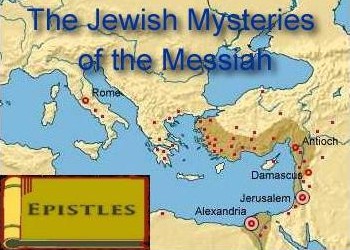 |
To a Historical Jesus
 |
||||||||
Many others follow. Some are part of the N.T.:
Other texts & authors similar to the Epistles without at least
any date & location about Jesus:
|
The Records |
Luke is the most prolific writer of the NT,
devancing Paul, and often contradicting him.
Beside their books, we know nothing about these authors, including their real name.
After the Gospels came the church Fathers in the 2nd and 3rd century CE: Ignatius of Antioch, Polycarp of Smyrna, Papias of Hierapolis,
Justin Martyr, Ireaneus of Lyons, Clement of Alexandria, Origen of Alexandria ...
Many other Gospels & fake letters have been written,
for a total of 21 and we know that others existed. See tab 'A Flood of Forgeries' below
|
|||||||
From 1st century BCE(?) to 300 CE(?) |
When |
From 85 CE(?) to Nowadays |
|||||||
From Rome to Alexandria, big cities in the eastern
part of the Roman Empire. |
Where |
Set up in rural Galilee and its neighborhoods,
but the Gospels could have been written anywhere. |
|||||||
|
Before 70 CE, the most important and earlier apostle we know of was a hellenized Jew called
Paul.
There were also many others:
James, Cephas, John, Apollos, Barnabas, Timothy, Titus, Andronicus, Junia... |
Who |
"To gain admission to the canon, Gospels were attributed to apostles (Matthew and John)
or to those dependent on apostles for their information (Mark and Luke).
But today, these persons are not thought to have been the actual authors.
None of the texts themselves give the author's name - all four are anonymous."
James M. Robinson The Gospel of Jesus: In Search of the Original Good News
Then the church Fathers Ignatius, Papias, Justin... |
|||||||
|

Preaching
Jesus Was |
|
|||||||
|
|
||||||||
|
How |
|
| The Dark Side of Christianity | |||||||
| A Unique Historical Context | 4 Interpolations | ||||||
|
A Massive Destruction |
Scriptures Corruption |
A Flood of Forgeries |
A Unique Context |
Josephus |
Tacitus (optional) |
1 Thessalonians 2:15 |
1 Timothy 6:13 |
|
"Who controls the present controls the past."
|
|||||||
| Last Chance for Jesus: 5 References to an HJ in the Epistles? | ||||
|
Kata Sarka |
Born of a Woman |
Brother of the Lord |
The Last Souper |
Died and Resurect |
|
See Logical Fallacy of Cherry Picking
|
||||
Credits
Most material is taken from Earl Doherty's book and web site Jesus Puzzle
Related Web Sites:
I highly recommend these books and documentary:
| 1971 | 1999 | 2000 | 2003 | 2009 | 2014 |
|
The Jesus of the early Christians |
 |
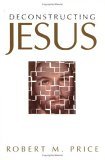 |
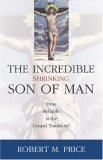 |
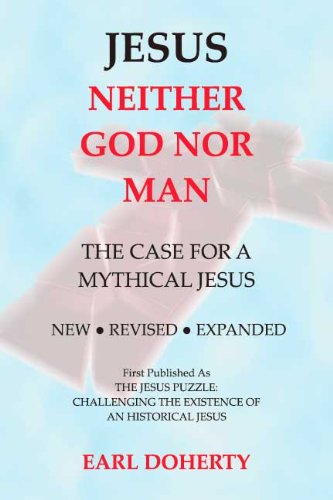 |
 |
|
The God Who Wasn't There (2005) |
Why Invent the Jesus? • Richard Carrier Ph.D.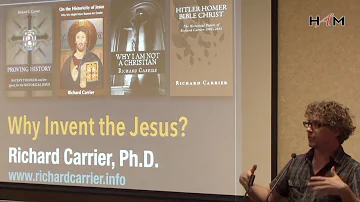
|
||||
In 1971, with his first, sensational book, The Jesus of the Early Christians: A study in Christian origins,
G.A. Wells embarked on a single-handed enterprise to revive the old thesis of German scholarship "fiercely debated"
at the turn of the 20th century -- "Die Frage nach der Historizität Jesu", whether Jesus ever existed.
After WWII, with Kalthoff, Robertson, W.B. Smith, Drews dead, Couchoud retired,
Schweitzer in Gabon, the debate went into dormancy.
The personal genesis of Well's ideas
Wells's interest started with his year abroad in Switzerland in 1946 as a 20-year old student of German,
lodging with a Swiss Protestant pastor who was a pupil of Albert Schweitzer (still very much alive then, d. 1965).
Wells was introduced to Schweitzer's momentous
The Quest of the Historical Jesus - A Critical Study of its Progress from Reimarus to Wrede" (German:1906, English Tr.:1910),
leading him to reflect on the question of the historical evidence for Jesus, and the lack of it, in the early Christian documents.
It took Wells 20 years to complete his first book, and three years to find a publisher, Pemberton, a traumatic experience.
But the 3,000-run sold out quickly, and his second book, Did Jesus Exist? (1975) , was easily accepted.
Importance of German
Wells found German even more important than ancient Greek:
His expertise allowed him to read in the original the great German historical critics (mostly never translated into English):
a massive amount, on both sides of the debate, of the most comprehensive scholarship in the world
(stamped with the famous "Deutsche Gründlichkeit", "German thoroughness") --
giving him a marked advantage in promoting the non-historicity thesis to modern English readers.
He also gained exposure to the Dutch Radical School, through German translations
(and English ones in "Encyclopaedia Biblica", and Thomas Whittaker's book).
From an Amazon Review
Then E. Doherty started on this idea after he encountered a
serious presentation of the theory by Professor Wells.
Afterwards R. Carrier switched position from HJ to MJ after he read
the Jesus Puzzle by Doherty (like me).
This Web Site By Vincent Guilbaud

 Scholars asserted the Quest for the HJ was impossible because of insufficient evidence,
and considered it both historically impossible and theologically illegitimate to write a biography of Jesus.
Yet, they tended to present Jesus as an Existentialist Philosopher.
Scholars asserted the Quest for the HJ was impossible because of insufficient evidence,
and considered it both historically impossible and theologically illegitimate to write a biography of Jesus.
Yet, they tended to present Jesus as an Existentialist Philosopher. Theologians emphasized how the redaction of the New Testament resulted from a process over time,
so that it included early textual layers, around which later and later layers crystalized.
The goal would be the detection of such early text.
Theologians emphasized how the redaction of the New Testament resulted from a process over time,
so that it included early textual layers, around which later and later layers crystalized.
The goal would be the detection of such early text.

